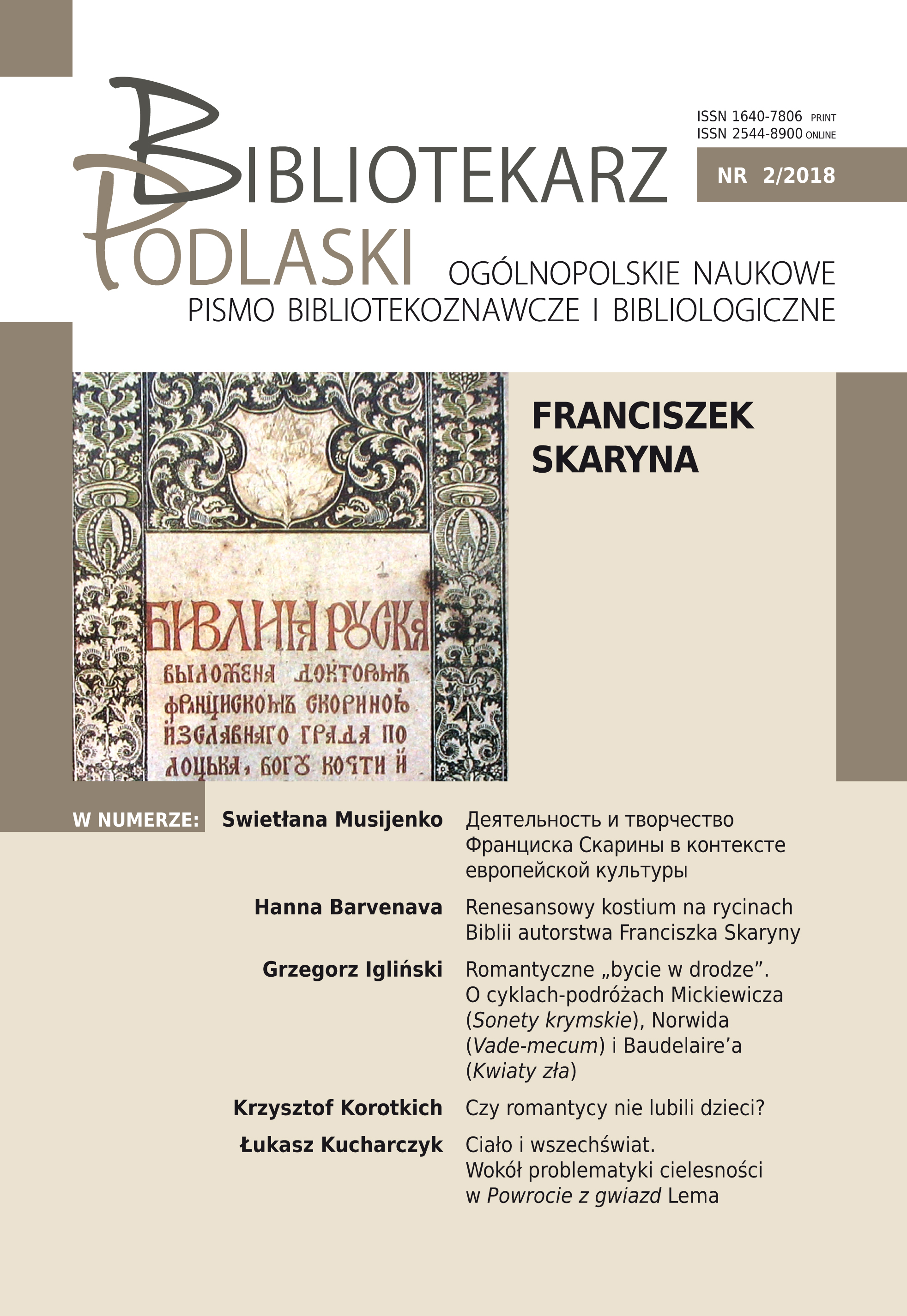Abstract
A child in Romantic literature is not just a character but a subject which stimulates common interest because of its ambiguous associations, stirring curiosity and, often, anxiety. These emotions are caused by the enormous potential of meanings imprinted in the symbolic functions of such a character. A Romantic child is clearly ambivalent: sensitivity, innocence, naivety, purity, life, hope (and other) are counterbalanced by the features that give rise to anxiety. A child may have demonic features, a death stamp, a hidden sickness, or it may be cursed. All that should remind the readers about an inherent ambiguity of human nature. A child in Romanticism may be an emanation of diabolic forces, which are difficult to recognise, but which people often succumb to. In numerous texts of this period, a child is an alter ego of adults, showing a dark side of their lives, and unwanted truth about human nature.
References
Ariès Ph., Miejsce dla dzieciństwa. Odkrycie dzieciństwa, [w:] Dzieci, wybór, opracowanie i redakcja M. Janion i S. Chwin, Gdańsk 1988, t. II.
Dzieci, wybór, opracowanie i redakcja M. Janion i S. Chwin, Gdańsk 1988, t. I-II.
Goethe J. W., Król olszyn, przeł. B. Grzegorzewska, [w:] Dzieci, dz. cyt.
Górski J., Dziecko w literaturze, Częstochowa 2017.
Jonca M., „Enfantes terribles”. Dzieci złe, źle wychowane w literaturze polskiej XIX wieku, Wrocław 2005.
Kubale A., Dziecko romantyczne. Szkice o literaturze, Wrocław – Warszawa – Kraków – Gdańsk – Łódź 1984.
Leszczyński G., Kulturowy obraz dziecka i dzieciństwa w literaturze drugiej połowy XIX i w XX w., Warszawa 2006.
Ławski J., Bo na tym świecie Śmierć. Studia o czarnym romantyzmie, Gdańsk 2008.
Malczewski A., Maria. Powieść ukraińska, wprowadzenie napisali H. Krukowska i J. Ławski, Białystok 1995.
Schiller F., O poezji naiwnej i sentymentalnej, [w:] Listy o estetycznym wychowaniu człowieka i inne rozprawy, przeł. I. Krońska, Warszawa 1972.
Słowacki J., Balladyna. Tragedia w pięciu aktach, [w:] Dzieła, pod red. J. Krzyżanowskiego, t. VII, Dramaty, oprac. M. Grabowska, Wrocław 1959.
Słowacki J., Sen srebrny Salomei, [w:] Dzieła, dz. cyt.
Szóstak A., Między mitem a rzeczywistością. Topos dzieciństwa w prozie polskiej po roku 1989, Zielona Góra 2012.
Szóstak A., W poszukiwaniu tożsamości. Liryczne horyzonty mitu dzieciństwa w poezji polskiej drugiej połowy XX wieku, Zielona Góra 2007.
Articles published in the “gold open access” mode on the basis of a non-exclusive license agreement between the publisher and the author. Permitted use:
- the publication may be read and stored on any device,
- the publication may be cited (with obligatory reference to the author, the title of the text, as well as the full title, bibliographic address of the issue and page of the journal)
The editorial team of “Bibliotekarz Podlaski” implements an open access policy by publishing materials in the form of the so-called Gold Open Access. From volume 42 (issue 1/2019), the journal is available under the Creative Commons license (Attribution – ShareAlike: CC BY-SA).
The key declarations of the Open Access and Open Science movement, which we fully support, are available on the CEON Open Science website.
COPYRIGHT:
The editorial team of “Bibliotekarz Podlaski” implements an open access policy by publishing materials in the form of the so-called Gold Open Access. The journal is available under the Creative Commons license – Attribution – ShareAlike 4.0: International: CC BY-SA 4.0).
The key declarations of the Open Access and Open Science movement, which we fully support, are available on the CEON Open Science website.
“Bibliotekarz Podlaski” allows its readers to read, download, copy, distribute, print, search and link to the full content of articles. We enable full, immediate, unlimited (both in a territorial, temporal and technical sense) open access to all published content, in accordance with the principle that freely available research increases and accelerates the global development of science and the exchange of knowledge.
The editorial team of “Bibliotekarz Podlaski” encourages authors to place articles published in the journal in open repositories (after the review or the final version of the publisher), provided that a link to the journal’s website is provided.
The journal does not charge the authors any fees for accepting and publishing their texts.

